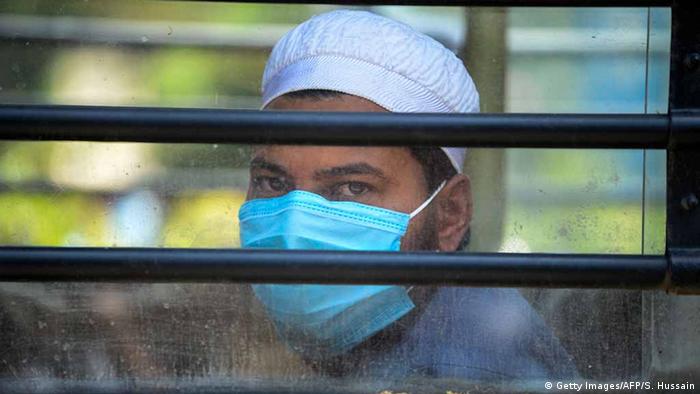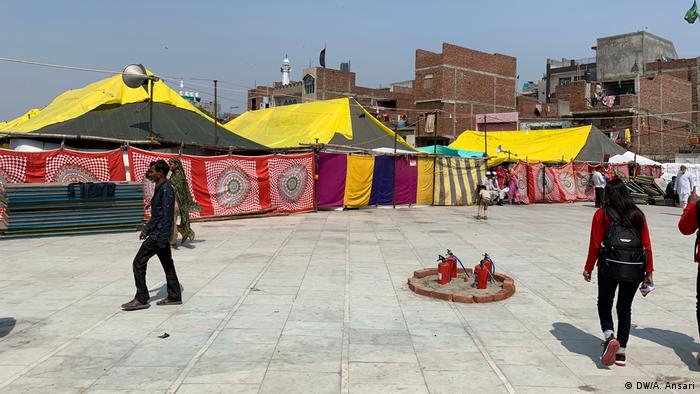Indian writer Arundhati Roy accused the Indian government of using social unrest during the coronavirus crisis to encourage “genocidal” behavior toward Muslims. Many political experts say Roy’s criticism goes too far.

Speaking to DW on Friday, renowned writer Arundhati Roy was scathing in her criticism of India’s ruling Bharatiya Janata Party (BJP), saying that the party was exploiting the public health crisis unleashed by the COVID-19 pandemic to ramp up suppression of Muslims.
She even compared the current state of affairs in India to the one that existed in Nazi Germany, adding that “the situation is approaching genocidal.”
“I think what has happened is COVID-19 has exposed things about India that all of us knew,” said Roy. “We are suffering, not just from COVID, but from a crisis of hatred, from a crisis of hunger.”
“This crisis of hatred against Muslims,” she continued, “comes on the back of a massacre in Delhi, which was the result of people protesting against the Citizenship Amendment Act (CAA).” The legislation accelerates the citizenship process for members of six religions, but not Muslims. It has led to fears that, if coupled with a proposed national citizens’ register, longtime Muslim residents of the country could be rendered stateless.
The BJP and its supporters have slammed Roy for making the statements. Nalin Kohli, a BJP spokesman, told DW that he rejects Roy’s viewpoint “in its totality” and that the claims are ” misleading, false and completely racist.” A BJP member tweeted that Roy “should be put on trial,” adding that her accusations “amounts to sedition.” Watch video 03:16
India’s BJP rejects allegations of Muslim suppression
Deepening religious divide
Some political experts DW spoke to said that they wouldn’t go as far to say that the Indian government is purposely stoking communal tensions to trigger something genocidal. Nonetheless, they agree that the current situation in the country is deepening the religious divide between Hindus and Muslims.
“I would not go as far to say that Muslims are being ghettoized like Jews were in Nazi Germany, but certainly the Muslim population in India is being vilified,” Sanjay Srivastava, a sociologist at the Institute of Economic Growth in New Delhi, told DW.
This view is shared by Nilanjan Mukhopadhyay, a Delhi-based writer and journalist who is the author of the book Narendra Modi: The Man, The Times. “I would say it would be premature at this point to liken the situation of Muslims in India to Jews of Nazi Germany and ghettoize them. But there has always been a long history of discrimination against Muslims ever since partition of this country in 1947,” Mukhopadhyay told DW.
Roy’s statements are “certainly provocative, and that’s no surprise given that Roy is known for espousing provocative views,” Michael Kugelman, a South Asia expert at the Washington-based Woodrow Wilson International Center for Scholars, told DW.
Read more: How New Delhi’s Muslims and Hindus faced violence together
Although India’s response to coronavirus has played out against an ugly, toxic social environment, Roy’s claim that the Indian government is deliberately inciting tensions to spark something genocidal “goes too far,” said Kugelman.
India positions itself as a democratic and diverse nation that takes strides to ensure religious harmony. However, Hindu-Muslim relations have long been tense, and this has led to occasional bouts of deadly communal violence.
Over the past several years, critics have repeatedly slammed the ruling BJP for implementing a Hindu nationalist agenda. Policies like the abrogation of Jammu and Kashmir’s special constitutional status and the new citizenship law are viewed by detractors as discriminatory toward Muslims, who make up about 14% of the India’s population.
“Additionally, several senior leaders have espoused witheringly anti-Muslim rhetoric. Such rhetoric is largely met with silence from Modi,” Kugelman said, adding that this broader dynamic has added to tensions between Hindus and Muslims.
 Delhi riots: Survivors struggle with constant trauma Momentary relief One of the relief camps for the victims of the riots has been set up inside an Eidgah, a large open-air mosque designated for Eid al-Fitr prayers. Set up by the Delhi government, it now shelters about 1,000 people affected by the violence. It’s located in the Mustafabad area of the Indian capital.
Delhi riots: Survivors struggle with constant trauma Momentary relief One of the relief camps for the victims of the riots has been set up inside an Eidgah, a large open-air mosque designated for Eid al-Fitr prayers. Set up by the Delhi government, it now shelters about 1,000 people affected by the violence. It’s located in the Mustafabad area of the Indian capital.
Muslims blamed for outbreak
With the outbreak of the novel coronavirus against this backdrop, people’s fears over health combined with religion-based mistrust has led to more social stigmas and discrimination.
Many COVID-19 cases reported across India were linked to a Muslim congregation held in Delhi last month by an Islamic sect called Tablighi Jamaat. After Indian authorities identified the sect as the biggest cluster of coronavirus cases in the country, many people started blaming the Muslim community for the spread of the disease.
Misinformation and fake news about Muslims purposefully spreading the virus was circulated by social media users as well as some mainstream media outlets. And hashtags like #CoronaJihad began circulating on Twitter.
“What is being portrayed is that Muslims are the disease and are at the heart of the health crisis, which is dangerous. The political class is silent about this and allowing it to happen,” Srivastava said.
Earlier this month, the Indian government acknowledged that certain communities and localities are being vilified based on false COVID-19 reports circulating on social media and elsewhere.
To address the problem, the government issued an advisory asking people not to spread on social media the names, identity or the locality of those affected by the virus or under quarantine. “Do not label any community or area for spreading COVID-19,” the advisory said. It also urged people to avoid spreading fear and panic.
Read more: Coronavirus: Indian mosque event becomes infection hotspot Watch video 02:47
India: COVID-19 crisis used to fuel religious hatred
‘A new normal globally’
“The fact that India is confronting so much communal messaging and tension now, at a moment when it is facing a global pandemic and one would expect it to come together as a country, doesn’t portend well for the future,” Kugelman underlined.
“That said, this is not a reality limited to India — it is a new normal globally, where you have forces of hardline nationalism and anti-globalization that are undermining notions of pluralism and tolerance.”
In fact, public health officials in various countries have warned against stigmatizing minority groups during the pandemic. In the US, after President Donald Trump and other officials referred to COVID-19 as the “Chinese virus” or the “Wuhan virus,” reports suggest an uptick in hate crimes against Asian Americans.
Although Trump said the label is “not racist” because the coronavirus originated in China, experts said it reinforces xenophobia and intolerance against Asian people.
In India’s case, to put an end to divisive communal rhetoric and bring Hindus and Muslims together, there should be stronger messages calling for unity from the very top, say analysts. PM Modi and top government ministers should issue strong calls for more solidarity and take measures to promote intercommunal harmony, said Kugelman.
“Unfortunately, I fear this is too much to ask, because the BJP’s social agenda is not about interfaith harmony, quite the opposite in fact,” he added. “Tensions and mistrust are so deep that the idea of formal efforts to bring the two communities together may simply not be realistic now.” Watch video 06:18
Arundhati Roy on coronavirus: ‘Situation in India is approaching genocidal’
Additional reporting by Murali Krishnan from New Delhi.
India police arrest 110 suspects over deadly mob lynching The mob mistook three men for being thieves before launching the fatal attack. The attack is the latest of a string of mob lynching incidents over the past year in India. (21.04.2020) How India’s loose data privacy laws open the door to hackers Hackers in India are taking advantage of a growing digital marketplace, combined with lax regulation, to steal data and sell it on the black market. Experts say regulation is not moving fast enough. (14.04.2020)
Audios and videos on the topic
COVID-19 lockdown exposes social disparities in India
- Date 21.04.2020
- Author Srinivas Mazumdaru
- Related Subjects Asia, India, Coronavirus
- Keywords Asia, India, coronavirus, COVID-19, religion
- Feedback: Send us your feedback.
- Print Print this page
- Permalink https://p.dw.com/p/3bCVY
